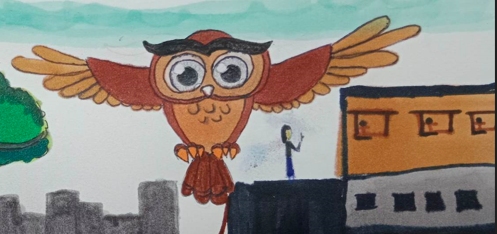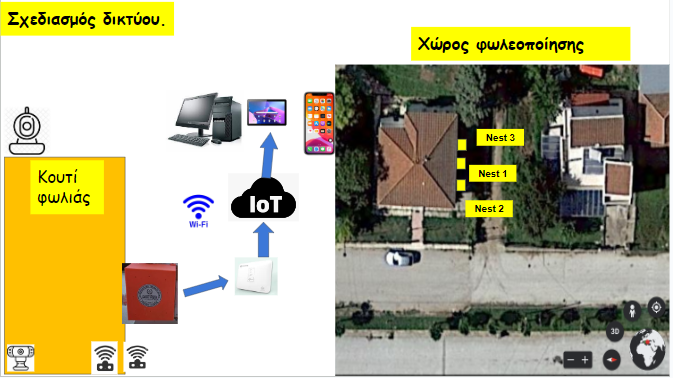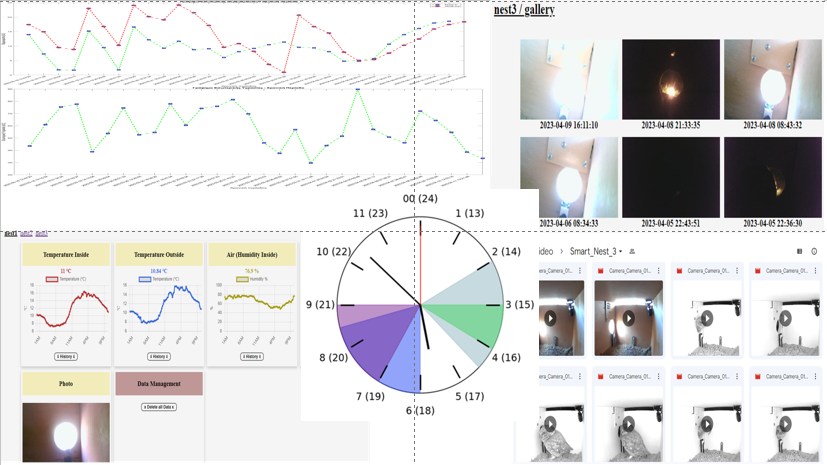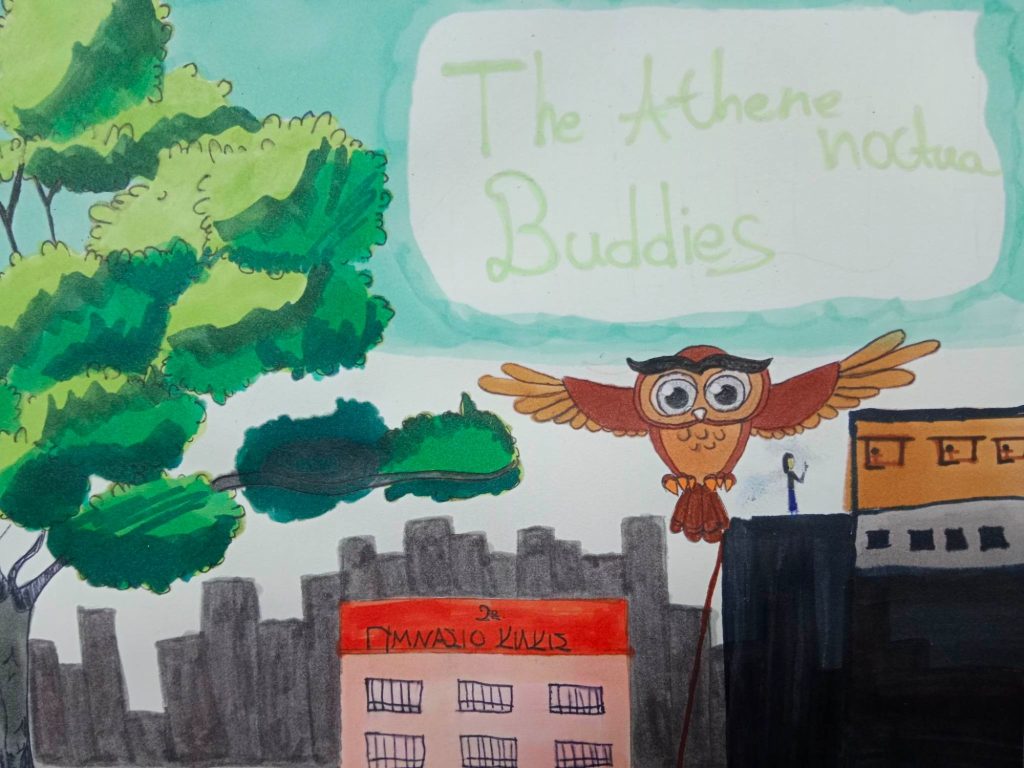Climate Detectives Projects 2022-2023
Project title: Farmland bird study: Studying the effects of climate change on the reproductive ecology of birds of prey in Kilkis
Team: The Athene noctua buddies
2nd Kilkis Experimental High School Kilkis Greece 10 Student’s age: 14-15 years old
The project aims to investigate how climate change affects the reproductive ecology of birds of prey in the Kilkis region.
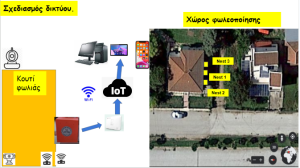
The project focused on studying the effects of climate change on the reproductive ecology of birds of prey in Kilkis, particularly the little owls. “The Athene noctua buddies” team used smart artificial nests to collect data on owl breeding patterns and studied historical climate data, future climate models, and the EO browser to investigate the impact of drought and global warming on the habitat of owls.
The team designed and converted artificial nests into smart ones, equipped with cameras and sensors to collect data on nesting behavior, egg-laying, and chick development. This information is used to determine how changes in temperature and rainfall patterns affect the timing and success of the breeding season.
The team also studied historical climate data to understand how weather patterns have changed over time in the region. By comparing current weather patterns with historical data, the team can identify trends and predict future changes in climate.
In addition, the team analyzed future climate models to predict how climate change might affect the region in the coming decades. By combining historical data with future projections, the team can determine how changes in temperature and precipitation will affect the breeding ecology of little owls and other birds of prey in the region.
Finally, the EO browser was used to study the effects of drought and global warming on vegetation and land use in the region. Monitoring changes in vegetation so the team can determine how climate change is affecting the availability of prey for little owls and other birds of prey in the area.
Overall, the Farmland Bird Study is an important project aimed at understanding the impacts of climate change on little owls and other birds of prey in Kilkis, by contributing important insights and data to help inform conservation efforts and protect the little owls and other birds of prey in Kilkis.
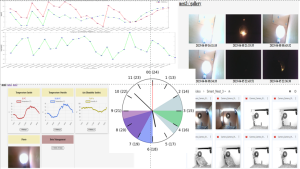
• Smart artificial nests are an effective tool for collecting data on bird behavior and reproduction that can help inform efforts in conservation.
• Analysis of historical climate data showed an increase in temperature and decrease in precipitation in recent decades, leading to a higher risk of drought and heat stress for birds, as more effort is required to search for food and water.
• Future climate models predict a continuation of these trends, with even higher temperatures and more frequent droughts in the coming decades.
• The analysis of historical climate data and future climate models revealed that the region will likely experience more frequent and severe droughts in the coming decades, which will continue to pose a threat to little owls and other bird species in the region.
• The EO browser proved to be a valuable tool and a valuable resource for monitoring changes in the environment, including changes in land use and vegetation, and monitoring the effects of climate change.
• A decline in soil quality and an increase in desiccation due to the intensive use of land for agricultural purposes has been observed
• Depletion of water resources, reduction of wetlands, as well as reduction of soil moisture was found
• There is a decline in yields from agricultural production, which is an important food source for the owl.
• Through research, the team discovered that little owls will be adversely affected in the future by rising temperatures and decreasing rainfall in the region, leading to a possible decline in their population.
The Farmland Bird Study is an important project aimed at understanding the impacts of climate change on little owls.
As the Climate Detectives team, we recommend further research into the effects of climate change on farmland birds and the development of mitigation strategies, including the use of smart nests and habitat restoration programs.
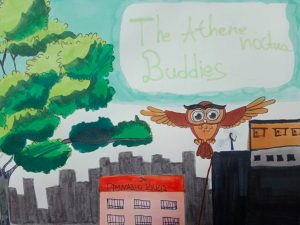
Action entitled: “Reduce carbon emissions”. The school distributed leaflets to the local community about taking action to reduce carbon emissions on International Earth Day. It contained proposals to promote energy efficiency measures, encourage the use of renewable energy sources and promote sustainable transport options.
Farmland birds buddies group (little owl and kestrel): Planning awareness campaigns about the effects of climate change on little owls and other birds in the area Students will create posters, videos, and social media campaigns to raise awareness and educate the community about the issue.
Monitoring Little Owl Populations: Students work with local volunteer groups to monitor little owl populations in the area. This could include conducting regular surveys and collecting data on the birds’ breeding success and survival rates.
Installation of more artificial smart nests with the cooperation of the Hellenic Society for the Protection of Nature for little owls and kestrels in the area to identify safe and suitable habitats for birds to breed and raise their young. These nests equipped with sensors to monitor temperature, humidity, and other environmental conditions will help researchers better understand the impact of climate change on birds.
Action for tree planting in the Anthophytos area where it can help reduce carbon emissions and also provide suitable habitat for little owls and other wild animals in the area.
Create awareness campaigns: Create awareness campaigns about the effects of climate change on little owls and other wildlife in the area. The students could create posters, videos, and social media campaigns to raise awareness and educate the community about the issue.
Collaboration of students with the Directorate of Agricultural Economy and Veterinary Medicine of Kilkis Prefecture to develop policies that support climate action and wildlife conservation. Going forward this will include writing letters to elected officials, attending town hall meetings, and advocating for policy changes that support sustainability and wildlife conservation.
https://www.facebook.com/groups/1469791397288150
Projects are created by the teams and they take the full responsibility of the shared data.
← All projects


